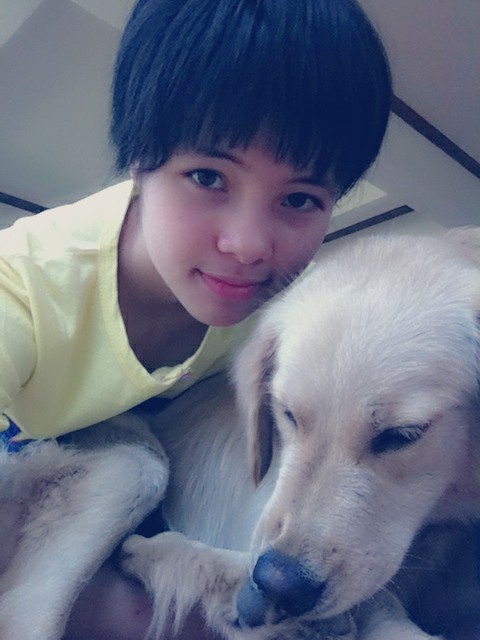
Animal reality, the reality experienced by animals, is on my mind. Look at Mali (spelled มะลิม, Thai for "jasmine", pronounced ma-LEE), my young golden labrador, the one with the snout and happy to be close to Angie, our family เพื่อน (pronounced purr-un, meaning "friend"). I always wanted a dog, but the possibility only arose very recently. She is immensely lovable and so forgiving, seemingly incapable of resentment.
It brought back to me the issue of how much of the THEE taxonomy is available to animals. By available, I mean is 'animal reality' something that is experienced and used naturally and spontaneously by a dog (say) as we use our psychosocial reality. Most people, but not TOP website members, are unaware that THEE governs how they function. In not being reflective, they are perhaps not too different from animals. Some scientists like Rupert Sheldrake, are prepared to assign consciousness to everything, and not just human beings exclusively. The fact that we have language and a sophisticated vocal apparatus, means we can actively communicate our experiences. Rocks face greater challenges in explaining themselves.
So this blog is sparked by speculations about Mali. Starting at the Root, I think we can assume some sort of Will is present. Although I don't see immediate evidence of projects more substantial than playing with beetles, let's unpack the levels in the hierarchy of Will together. RL1: Action—that seems to be there. RL2:Inquiry—Mali certainly investigates. RL3:Change—I don't understand that well enough to comment, but she seems to know when something is different. RL4:Experience—she surely has sensations and emotional experiences. RL5: Communication—that occurs in both directions e.g. when she decides it is time for me to take her for a walk she comes to me at the computer with her lead in her mouth. RL6:Purpose—Mali seems to have purposes and probably values. RL7:Willingness—both being willing and being reluctant are evident. So, I suspect all Levels are present. But does Mali form and pursue Doggy Endeavours as we form Personal Endeavours? Does she experience my dynamic duality: autonomous v constrained (or soverereign v bound)? Can she combine the levels of will to be creative?
Perhaps I should investigate a few of the Primary Hierarchies that elaborate each of these Levels to discover more. I particularly wonder about the presence of Levels 6 and 7 which appear to tap into reason and imagination respectively. These two highest levels in any framework guide the use of the whole of that framework. But as I haven't posted many of these, let's leave that for another day. (If you want to speculate on your own, look at the one Primary Hierarchy which is posted: Communication.)
Instead, I want to grasp a more fundamental issue: psychosocial reality. Do animals have such a reality distinct from their empirical reality? I think they must. Because, from the above, they have experiences and it is evident they interact with other animals and humans based on those experiences. If so, then animals have psychosocial reality as we do, and animals live in psychosocial reality as we do, and they react in terms of that reality as we do.
But there is a difference.
Animals do not and cannot create psychosocial reality as we can. If not, then they cannot make goodness real.
We can. But do we?
A primary goal of early religion was to raise humanity above the level of animal instinct and provide rather basic notions of goodness, like not murdering your neighbour. Then and now many treat others as little more than animals. You buy and sell a person like you do a cow. You beat a child like you beat a dog.
In time, the wisest saw that even beating dogs was not a good idea. They went further and suggested there was such a thing as a virtuous life unique to human beings. But the scientific establishment has forgotten that this is possible. If you learn about being human from ants, then you reduce a person to an ant. You can certainly discover what people and ants have in common, and that may be valuable. But there is no way you can learn from ants what is unique about being a person. It's not just logically impossible, it's insane.
If scientists do not realize that we create our reality, you do. Looking around, you will see that most everyone is submerged in their own experiences. Being submerged or locked into one reality means adapting to it. If you adapt, you may go one better and exploit your reality. But that inevitably reinforces a personal and social world that may not be as it should and could be.
Until you realize that your psychosocial reality is a pure creation, you cannot make the creative effort to generate something new and better. Instead you will go round and round in circles of self-admiration, blame and exhortation. My current favorite example, as I recently blogged, is politics. But much the same could be said about many close relationships, or about management in most organizations.
But this is going to change. You, the reader, are in the vanguard of this change. The value of self-knowledge is not new. But its current social acceptance is. The present wave started with the self-awareness stimulated at the beginning of last century by Freud. Although ridiculed by fashionable thinkers and academics, his insights transformed society and shaped the thinking of those who do the ridiculing. This century we will see a further quantum shift in this enlightenment: one in which awareness permits a distance from psychosocial reality. By using this objectivity, anyone can appreciate the structure and rules of psychosocial reality, even help improve their articulation within THEE. As a result, we will be able to generate personal and social improvements beyond current imagining.
Alternatively: live in animal reality.
What's your view about animal experiences? Are we different to animals? Will animals experience the 21st Century enlightenment?
WK
About
Warren Kinston